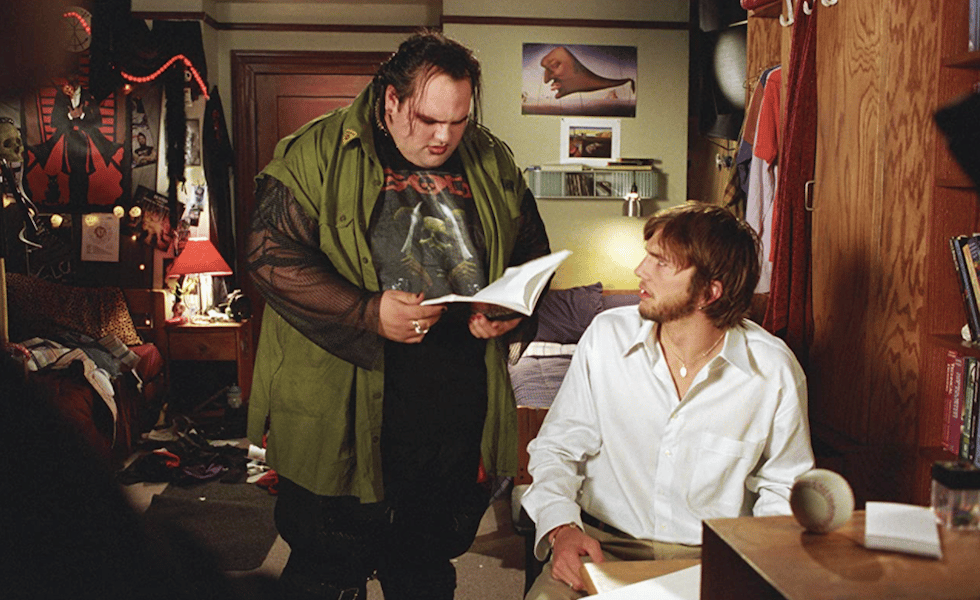Among the early 2000s glut of commercial horror, the Ashton Kutcher vehicle is a particularly dark star.
Content warning: this article deals with child sexual assault, rape, animal cruelty and substance abuse.
Last week marked the 18th anniversary of The Butterfly Effect. Starring Ashton Kutcher and Amy Smart, the high concept thriller hit cinemas on January 23, 2004, which means its now of the age of consent – unlike the kids at a certain key point in the film. In an ideal world I’d have published this piece on the anniversary, but the world got in the way and, unlike Kutch’s Evan Treborn, I lack the psychic ability to travel back to an earlier point in my life to correct the error, so let’s plough on.
Time travel is, of course, the crux of The Butterfly Effect, which comes to us courtesy of writing and directing team Eric Bress and J. Mackay Gruber (Final Destination 2). Kutch’s character is the product of a horribly abusive childhood and has a lot of gaps in his memory, but he discovers that if he reads from his teenage diary, he can project himself back into his younger body and change things – hopefully for the better.
Narrator: it was never for the better.
And boy, does Evan have a past that needs changing! Looking back at it now, what’s striking about The Butterfly Effect is how dark it is. Released eight years after the original Scream revitalised horror as a commercial genre, it was coming at the very tail end of a swathe of teen-focused, easily digestible, fun horror flicks, mostly of the slasher variety – your Urban Legends, I Know What You Did Last Summers. These were already waning, with the more visceral zombie subgenre about to claim primacy (28 Days Later had debuted the year before, and Zack Snyder’s Dawn of the Dead remake would hit two months later).
But The Butterfly Effect is not a slasher, and at times it makes even a zombie apocalypse seem preferable to what Evan and his friends endure. It’s surprisingly early in the proceedings when we see neighbourhood dad George Miller (a game, sleazy, Eric Stoltz) force a young Eric (John Patrick Amedori) to make child pornography with his own daughter, Kayleigh (Irene Gorovaia, with Amy Smart playing the adult version) while his budding sociopath son, Tommy (Jesse James, with William Lee Scott as the adult version) watches on. Tommy later burns Evan’s beloved dog to death in front of him. A prank with a stick of dynamite kills a mother and her baby, traumatising Evan’s friend Lenny (Kevin G. Schmidt as a kid, Elden Henson from Daredevil when all grown up) for life. With all that, plus seeing his father (Callum Keith Rennie) shot to death by prison guards before his very eyes, it’s no wonder Evan wants to change his past, engineering a present where he and love interest Kayleigh have a future together, and Lenny and Even Tommy aren’t complete basket cases.
But every change only makes things worse.
I must confess admiration for everyone’s commitment to the bit. The whole premise of The Butterfly Effect, whose title is taken from a deliberate misreading of the chaos theory concept, is that all Evan’s efforts to fix things just fuck up his life even worse, and when you’re starting from, well, everything outlined above, you have to try pretty hard to go ‘worse’. Every time he changes his past, Evan wakes up in a new reality. In one, Kayleigh is a drug-addled sex worker – must try again. In another, he’s in prison for killing Tommy (fair enough…) and has to shank an Aryan Brother to avoid rape. In yet another – and the way this is shot cracks me up every time – he’s a quadruple amputee, having had his limbs blown off trying to stop the dynamite gag.
Burn, Michael, Burn.
All this is happening to Michael from That ‘70s Show, mind you, which I think is part of why The Butterfly Effect took a critical hammering. Not that it was ever going to trouble the Academy, but it’s solidly executed and admirable in just how far its willing to go. Kutcher, as a performer, might be light on technique but he’s big on charisma, and he acquits himself as well as can be expected here – he’s certainly more convincing as a universe-hopping abuse survivor than he was as Steve Jobs. The supporting cast are good, and its always fun to see a pre-ripped Ethan Suplee turn up – he was everywhere for a while there, and his turn as Evan’s college roomie, Thumper, all gothed up and angry at the world, is a blast.
Indeed, there’s a lot to enjoy here but – and this is important, I feel – a lot of it is in exceedingly poor taste, and your enjoyment is going to depend on where your personal boundaries are in terms of what’s fair game and what’s off limits. Personally, for me anything is up for grabs depending on the execution, and while a dry listing of The Butterfly Effect’s content looks pretty rough, it’s audacious enough and juuuuust artful enough to make the grade.
And speaking of audacity, do make sure to track down the directors’ cut of The Butterfly Effect if you can – which is, sadly, not the version currently on Netflix. That version has a happy ending (and several were considered), but the preferred version takes the concept about as far as it can go. Evan, realising that every possible action he can take only ruins his friends and family even more, makes the ultimate sacrifice – he jumps back in time to when he was still in utero and strangles himself with his own umbilical cord.
Spoiler? Maybe, but the movie is almost 20 years old, folks. Still, c’mon – something that ballsy has got to be worth your time.








